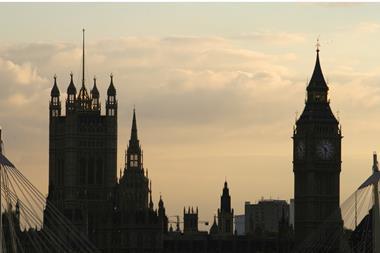Three-quarters of UK investors polled by investment specialists SEI are either already using, or plan to employ, a liability-driven investing (LDI) strategy.
The survey was completed by 130 corporate pension executives from the UK, US and Canada, with nearly half from the UK.
Of the 75% who showed interest in LDI, 47% are actively using it, up from 33% in 2012.
The survey also showed a growing sophistication among UK trustees in their approach to LDI, with the use of more tactical and creative tools for managing liability risks such as synthetic Gilts (19%), options (15%) and alternatives (19%).
Some 40% of UK respondents outsourced responsibility for the choice of instruments used to hedge liabilities, and 26% did so for the amount of hedging undertaken.
Each year, respondents are asked to rank the various measures of a successful LDI strategy, from a choice of six.
The top concern this year was still the need to control funded status volatility.
But increasing in importance, from fifth to third place, was progress made towards termination of the plan.
And the need to improve funding levels has risen from fourth to second place.
The poll also revealed that more than two-thirds (69%) of participating UK investors either use, or plan to use, an active approach towards asset allocation – such as a ‘glidepath’ strategy – which targets a fully funded status.
In other news, life expectancy figures from the Office for National Statistics (ONS) point to a slowing down in the rise in UK state pension age than would have been expected, according to an analysis by Towers Watson.
The consultants said the state pension age would reach 68 in 2036 (starting to rise in 2034) and reach 69 in 2049 (starting to rise in 2047).
It would then start rising in 2061, reaching 70 in 2063.
Towers Watson said the rises come slightly later (around a year for the increases to 68 and 69) than would have been expected using the previous set of ONS life expectancy assumptions.
This is because the ONS estimate of life expectancy has fallen, compared with two years ago.
The government’s target is that people should expect to spend “up to one-third of their adult lives” receiving state pensions, which means the state pension age is very sensitive to changes in life expectancy assumptions.
Matthew Fletcher, senior consultant at Towers Watson, said: “People have become used to thinking life expectancy can only go up, due to improvements in medicine and more healthy behaviour – for example, less smoking.
“But if you are already taking the credit for that, you don’t need things to get worse for predicted life expectancy to fall. You just need them to improve less quickly than had been expected.”
Meanwhile, the Pension Protection Fund (PPF) has confirmed that the pension protection levy estimate for 2014/15 will be £695m (€828m), as originally proposed.
The levy is the last to be set under the first three-year period of the new levy framework implemented in 2012/13.
The PPF has also confirmed that the levy scaling factor, which matches the amount collected from individual schemes to the total levy estimate, will stay at 0.73.
Furthermore, the PPF has appointed Experian is its new insolvency risk provider from 2015/16, the start of the next three-year period for the levy.
Experian replaces current provider Dun & Bradstreet.
Lastly, UK MPs are currently debating the pension rights of 3,000 former employees of Visteon UK.
In 2009, Visteon UK – a subsidiary of the US-based automotive parts company, which is a spin-off from Ford – went into administration, making its employees redundant.
Most workers had transferred from Ford and been promised that their terms and conditions would be protected.
Following a sustained campaign by workers, a redundancy settlement was reached, but the ex-employees lost up to 45% of their pension entitlement.
Pension Protection Fund compensation will not cover the amount lost, and the workers’ union Unite has been running an active campaign to persuade Ford to pick up the bill.
It has now been successful in getting the House of Commons backbench business committee to hold a debate, after 66 MPs from all parties signed a letter of support.












